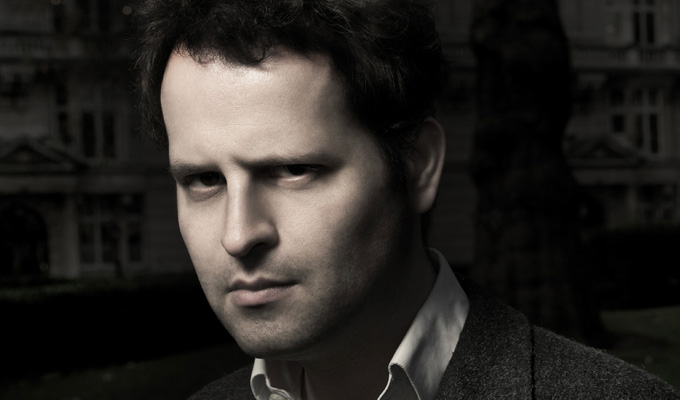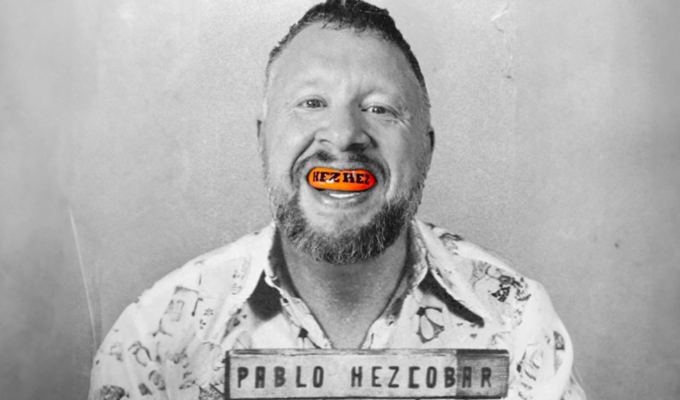 © Idil Sukan
© Idil Sukan 'I'm pretty sure no one has made a medical show that’s quite as disgusting before'
Adam Kay on the TV version of This Is Going To Hurt
Adam Kay’s adaptation of his own NHS memoirs, This Is Going To Hurt, comes to BBC One tomorrow. Here, the comedian and writer talks about the strains of a career in medicine ‘earning less than the hospital parking meter’, the combination of comedy and tragedy on the job… and what it’s like to be portrayed on screen by Ben Whishaw.
What is This Is Going To Hurt about?
It's the story of a junior doctor in obstetrics and gynaecology (or brats and twats as it’s known) and the huge impact this job has on his life - both at home and at work.
How did you find the process of adapting your own book to the screen? Is it much the same as the book, or will there be lots of new elements?
The nature of the book - hundreds of diary entries in a single person’s voice - meant that a totally direct adaptation would have been something of a one-man sketch show.
The TV series expands the world, predominantly in terms of the other characters we meet: from Adam’s family and boyfriend, to his midwife colleagues and other doctors. I’m sure people who have read the book will recognise lots of the scenes and hopefully feel that it’s still as funny, sad and ,of course, repulsive as they remember.
I’d like to think that no one has made a medical show that’s quite as real before - and not just in terms of the clinical details. I remember watching an episode of Doctor Foster (which I adored) - there was a scene in a surgery and my husband asked me if it was accurate. It was spot-on medically, but it didn’t quite explain how a GP had time to have all these dinner parties, let alone run a vigilante detective outfit.
I’ve often thought that medical programmes don’t tend to paint the life of a doctor in three full dimensions, and I think that’s something we’ve achieved really well. I realise I drove Lucy [Forbes] and Tom [Kingsley], our brilliant directors, absolutely bananas with my insistence on keeping things as real as possible - from the font on the hospital posters to the exact model of car that Adam drives - sorry!
Also, I’m pretty sure no one has made a medical show that’s quite as disgusting before.
The show is set in 2006, when your diaries were written, Does it still resonate, today?
There’s something of a universality about the life of a medic. I remember from the moment the book came out, I would get emails from doctors all around the world telling me that it could have been set in their hospital in Germany/Goa/Greece/Ghana. And even though some of my diaries were set before today’s medical students were even born, I receive messages from them saying that nothing much has changed (which is a little depressing).
Ultimately, the show is a love letter to the NHS - to my mind the country’s single greatest achievement: healthcare that’s free at the point of service, always based on your clinical need and never based on your bank balance.
The NHS only exists because of the 1.4 million people who work there, going far beyond the call of duty to keep the rest of us on the road.
The pandemic has reminded us quite how hard they work, quite how much they sacrifice and quite how little slack there is in the system, and This Is Going To Hurt really underlines that.
Do you think this portrayal of a career in medicine might surprise people?
My diaries were published in the first place because I wanted people to understand the true nature of a doctor’s job. I think people were definitely surprised: the constant tsunami of bodily fluids, earning less than the hospital parking meter, and the difficulty in maintaining friendships and relationships when you’re working 97-hour weeks.
I certainly didn’t know any of this when I applied to be a doctor in the first place, and I rather wish I had. I’ve had quite a few messages from angry parents telling me that my book has put their children off a career in medicine - I’m pretty sure that if a book put them off being a doctor then being a doctor would have really put them off.
The TV show has the capacity to reach a far bigger audience, and really let them know about the huge toll being a doctor takes on the human beings underneath the scrubs.
The show demonstrates how much responsibility and pressure is placed on the shoulders of young medics. Do you hope this show will contribute to greater awareness around how this affects our medical professionals?
People will potentially be very surprised about quite how deep the deep end is in medicine, and how steep the learning curve accordingly has to be. I wish I could say that any aspect of this has been exaggerated. By the very nature of the job, there are a lot of 'bad days', and on labour ward those bad days can obviously be extremely bad.
The attitude in medicine is very stiff-upper-lip based - you’re a bloody doctor and you bloody get on with it.
The book and the show both highlight doctors struggling after difficult incidents. When the book was released, I was contacted by dozens of medics who told me that until they read it they thought they were the first doctor who’d ever cried in the locker room. The truth is that most doctors end up crying in a locker room but no one ever really talks about it.
Things have got slightly better since I last did a shift on labour ward, but not better enough, and not fast enough. If the show can help shift the dial a bit on how the NHS deals with the mental wellbeing of its staff that will mean a lot more to me than any awards or viewing figures ever would.
Amid the drama, there are lots of hilarious moments too. How true are these highs and lows to real life on an Obs and Gynae ward?
I strongly believe that the only honest way to portray life in a hospital is as a comedy-drama. Much as a sitcom could never speak to the urgency and tragedy of life on the wards, nor could a straight drama convey the funny and ridiculous situations that pepper every doctor’s day.
You can have a hilarious moment in antenatal clinic that you know you’ll be recounting in pubs for years, and two minutes later you’re telling a patient that you can’t find their baby’s heartbeat - it’s a job of contrasts and constant gear-shifts.
How does it feel to have Ben Whishaw play you in your own TV show?
To have the finest actor of his generation playing me? In a career-defining performance? Yeah, it’s OK, I guess.

The cast is an absolute dream - from acting royalty, like the incomparable Harriet Walter, to tomorrow’s superstars like Ambika Mod, who it’s almost impossible to believe is in her first role. Every member of the cast brings drama and comedy in bucketloads, and it all adds up to what I think is a very honest and recognisable portrait of the NHS.
Do you think any former colleagues or patients will recognise themselves in the show?
I rather hope that no patients will recognise themselves, because I don’t particularly want to end up in prison for breaking their confidentiality. Although I guess that would make my diaries more interesting for the next few years.
What do you hope audiences – especially NHS workers take away from the series?
I hope they laugh, I hope they cry, and I hope they realise more than ever what an amazing and precious thing we have in the NHS and how much more we need to do to look after the people who work there. For the brilliant people who work in the NHS, I hope they feel that I’ve done their story justice.
• This Is Going To Hurt starts on BBC One on Tuesday February 8 at 9pm.
Published: 7 Feb 2022






